Informative Speeches Chapter Thirteen Table of Contents

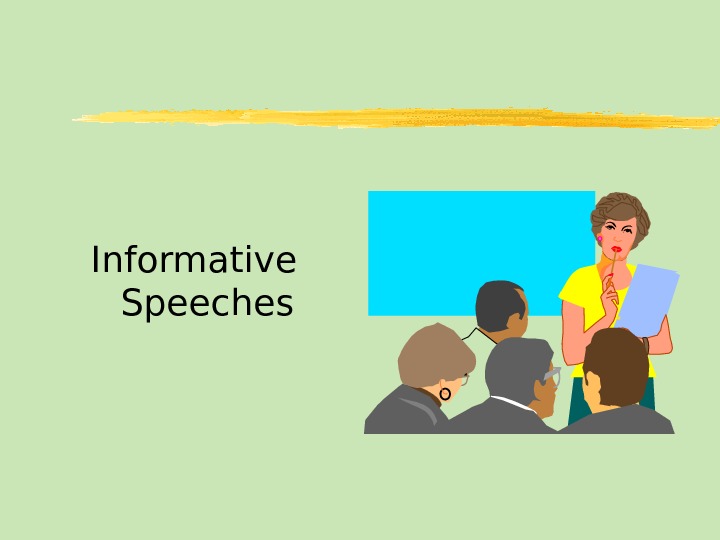
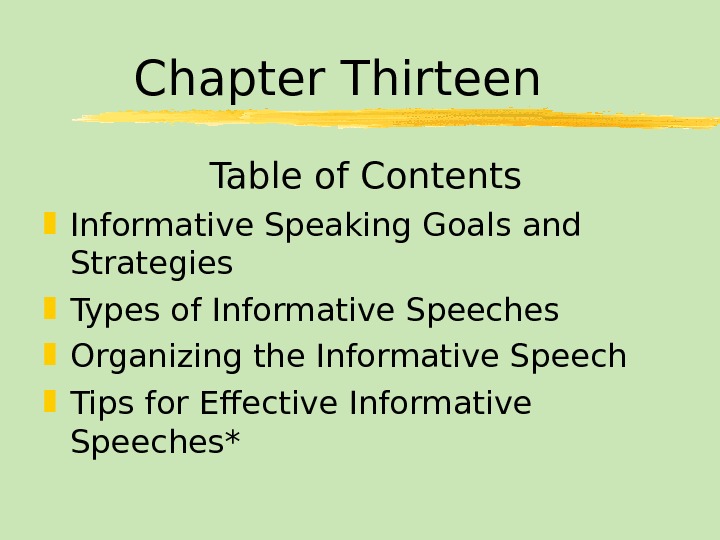
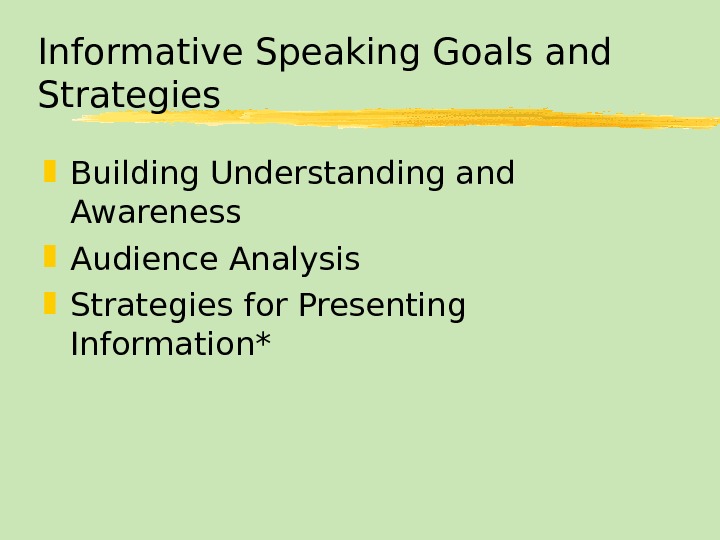
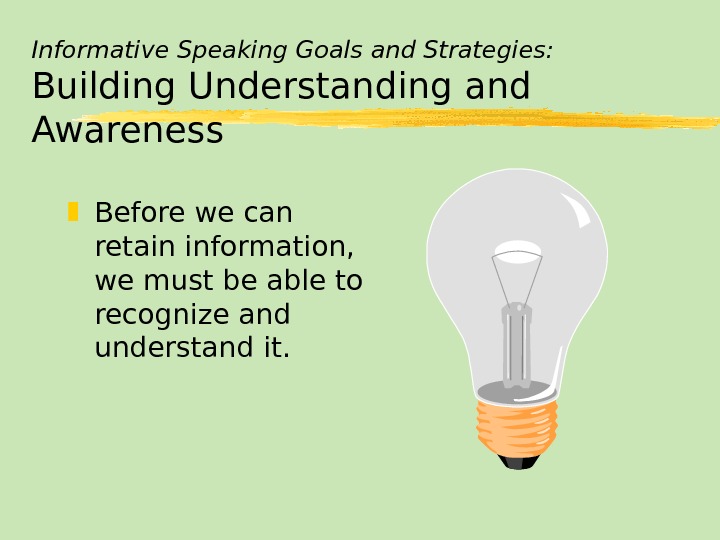
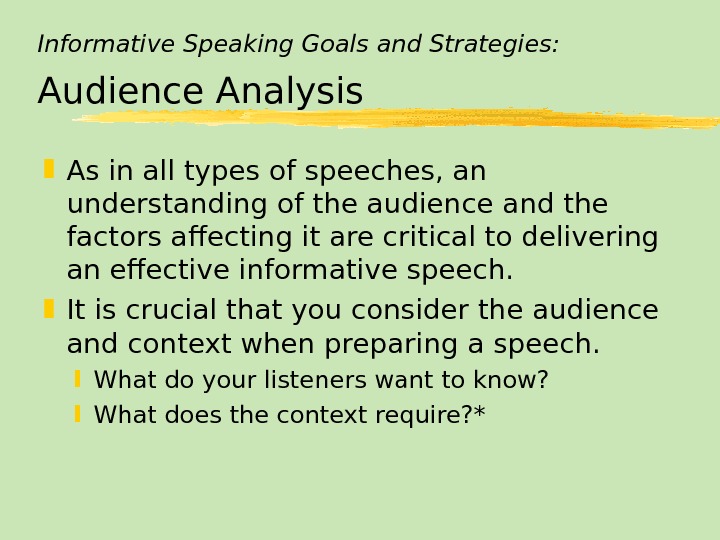
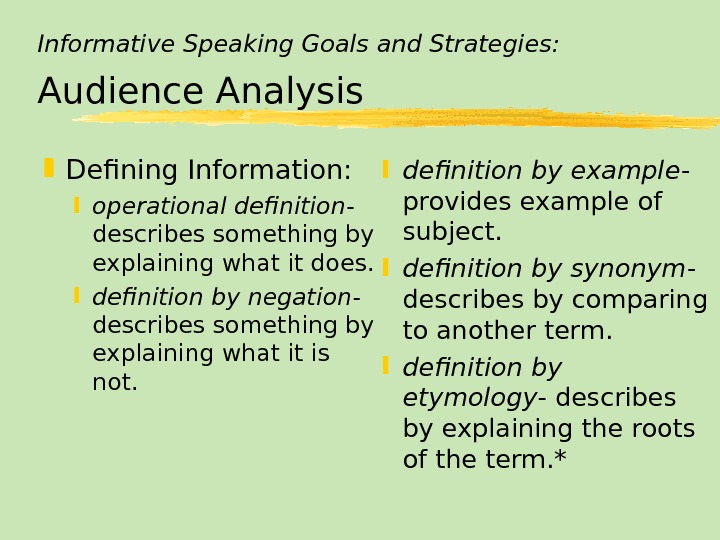
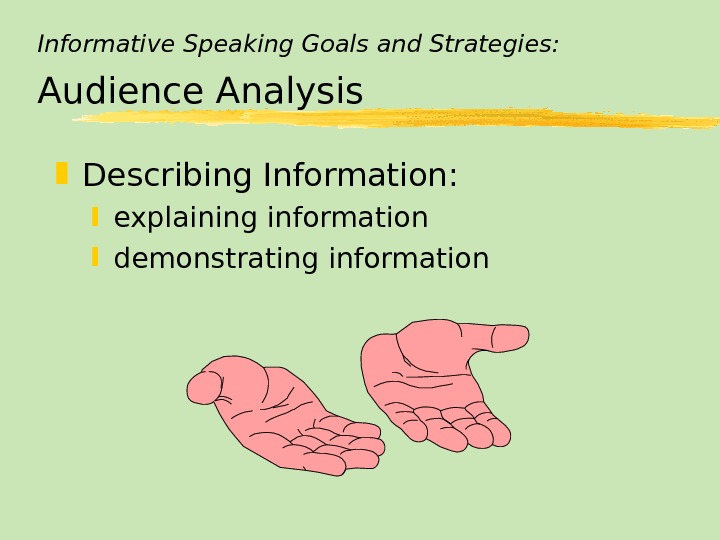
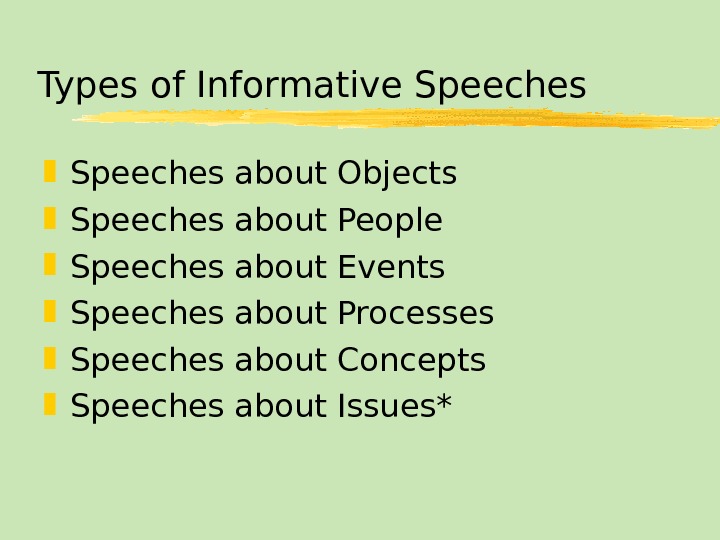
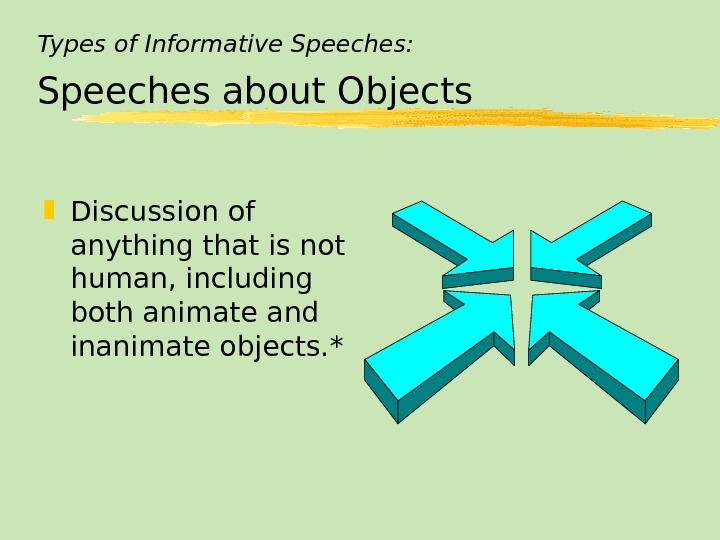
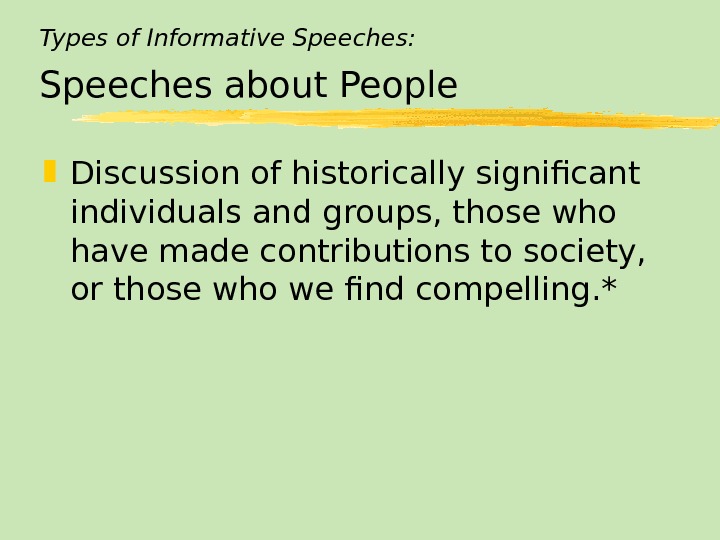
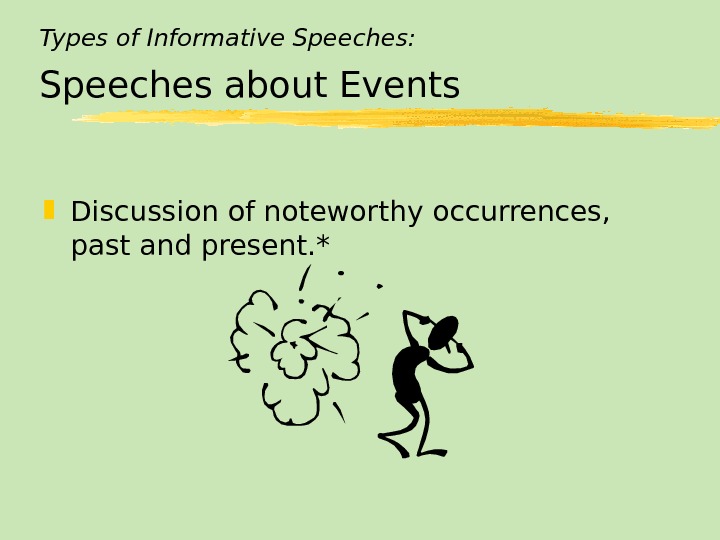
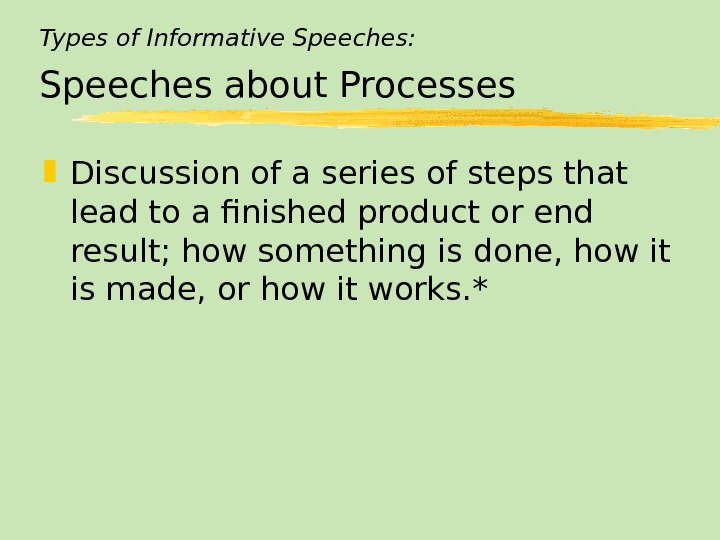
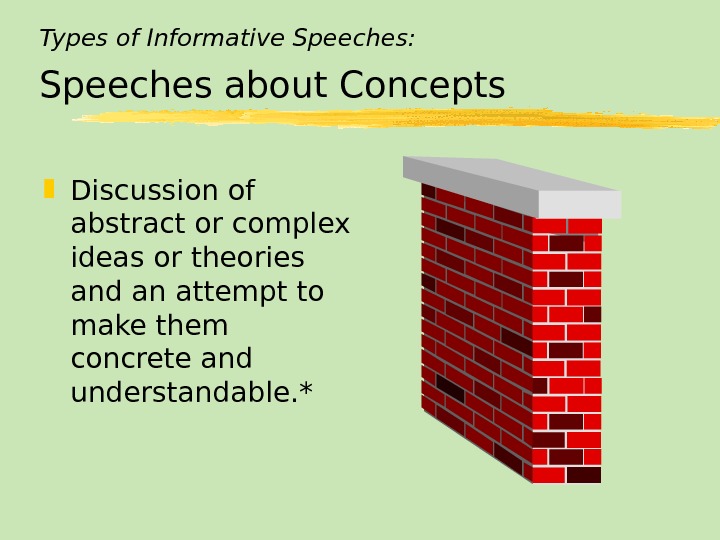
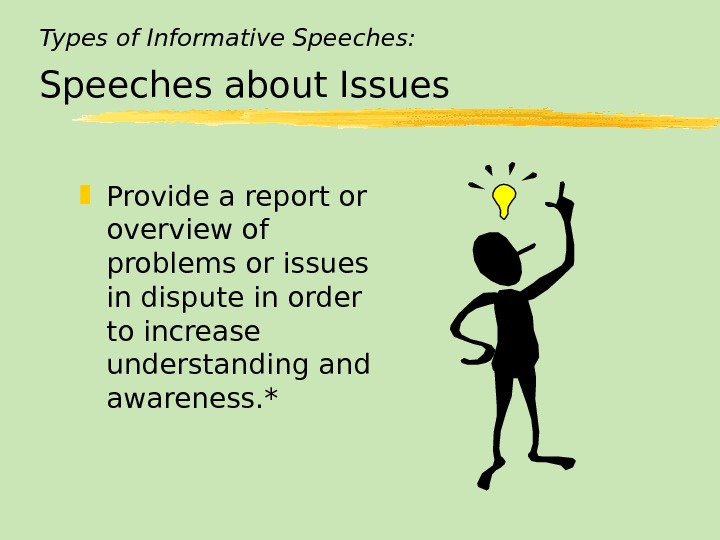
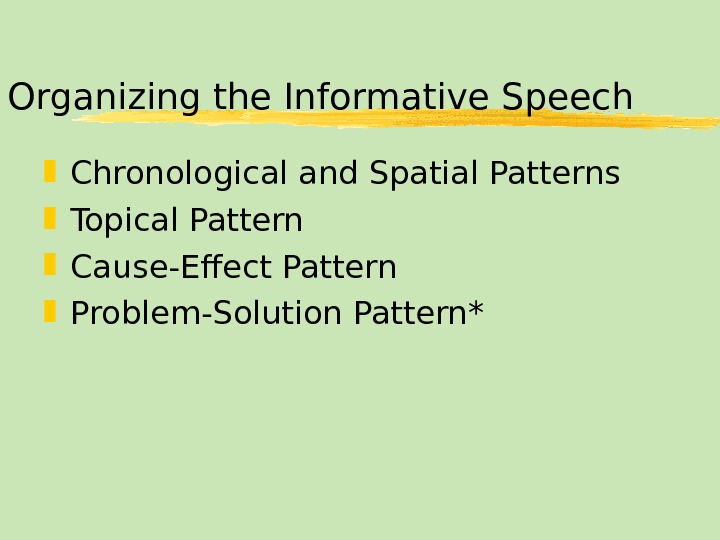
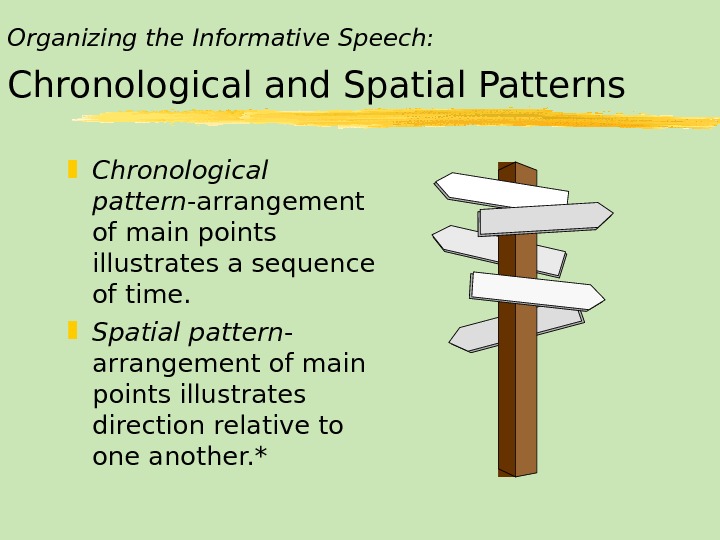
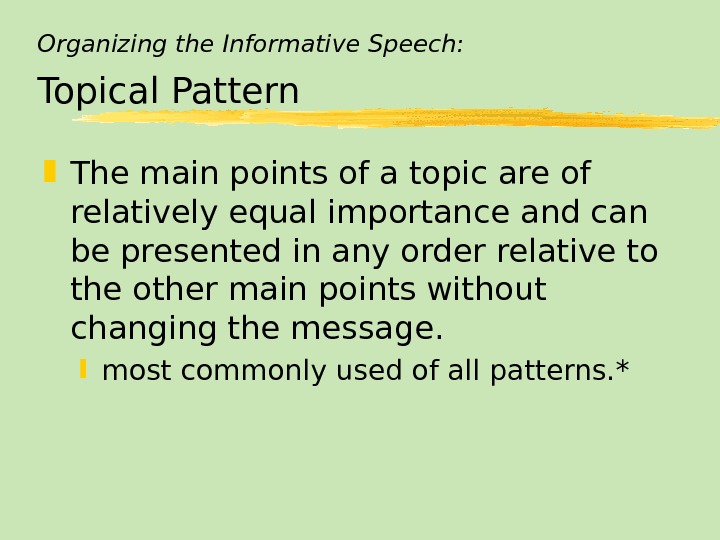
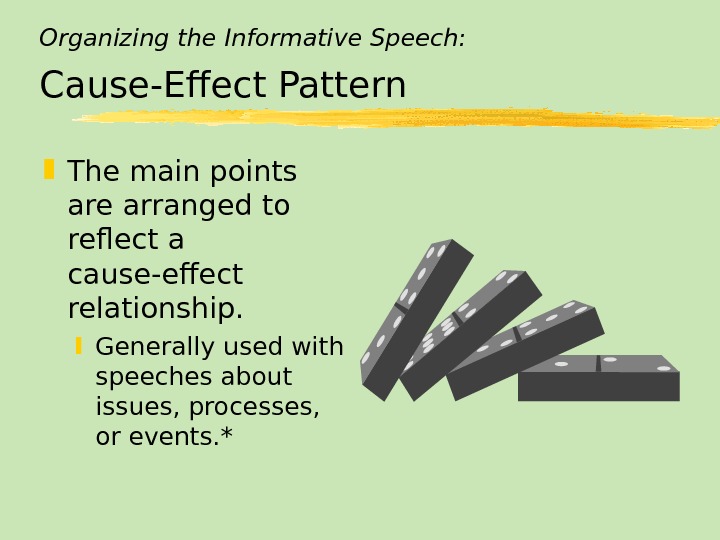
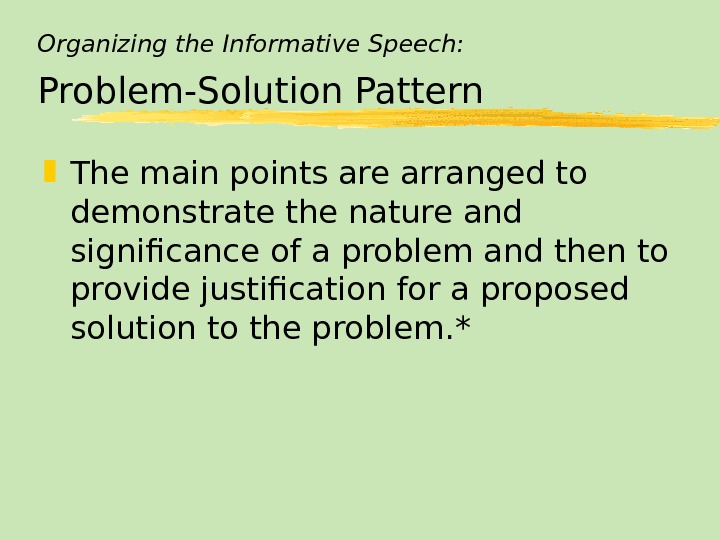
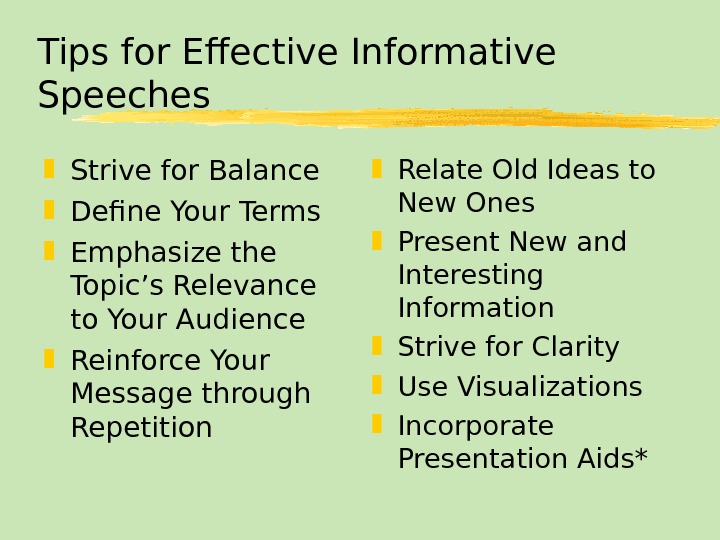
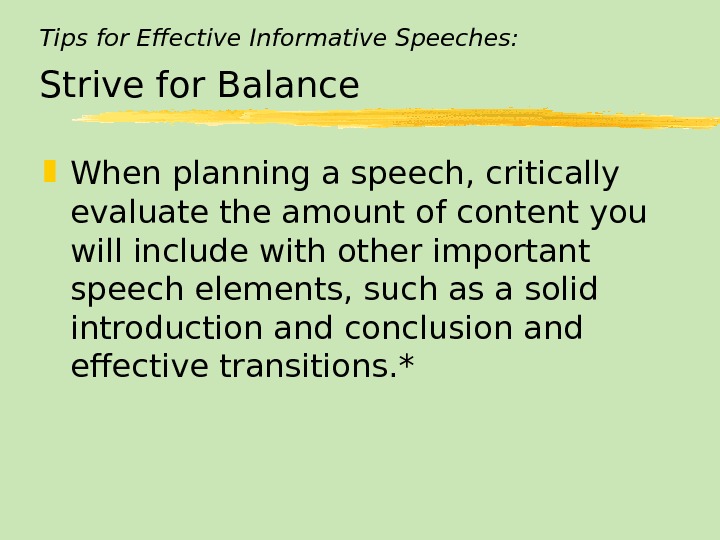
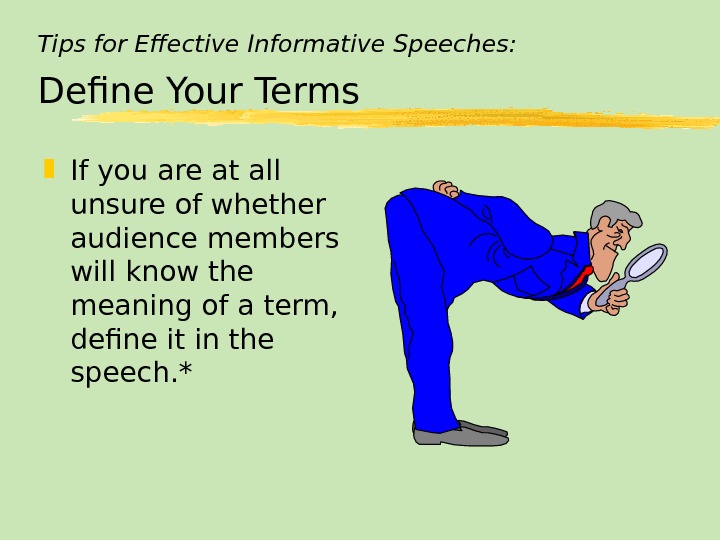
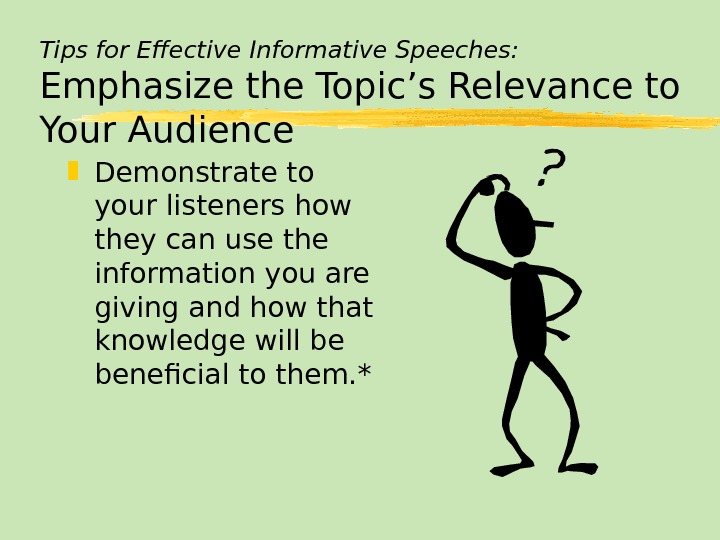
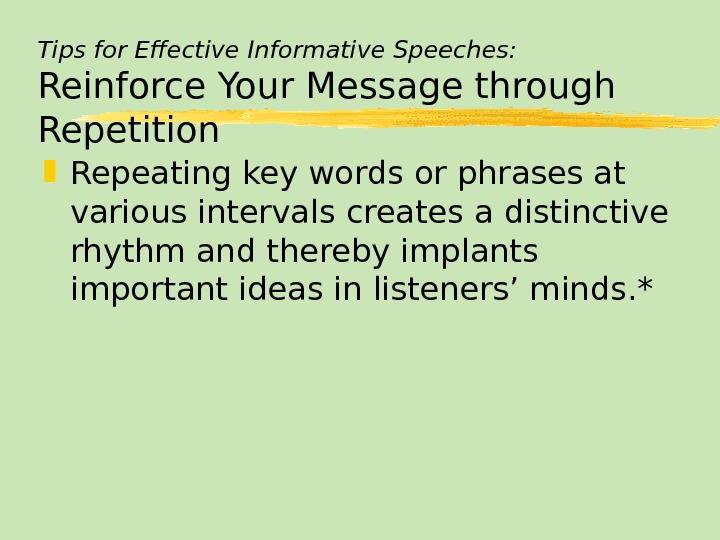
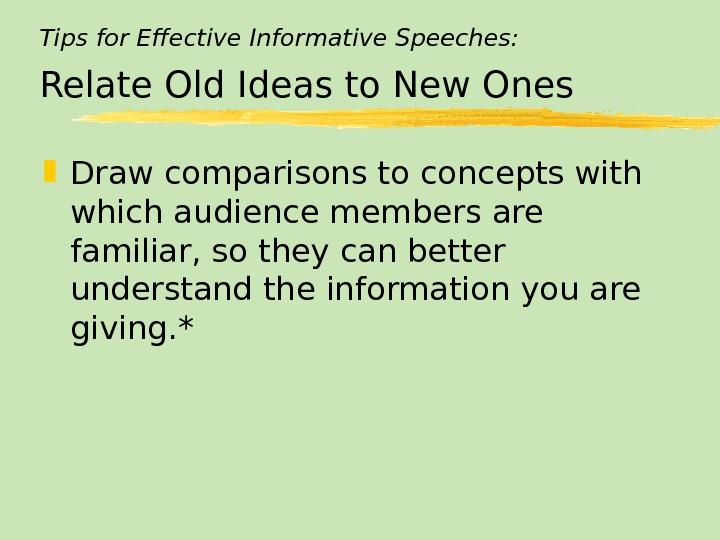
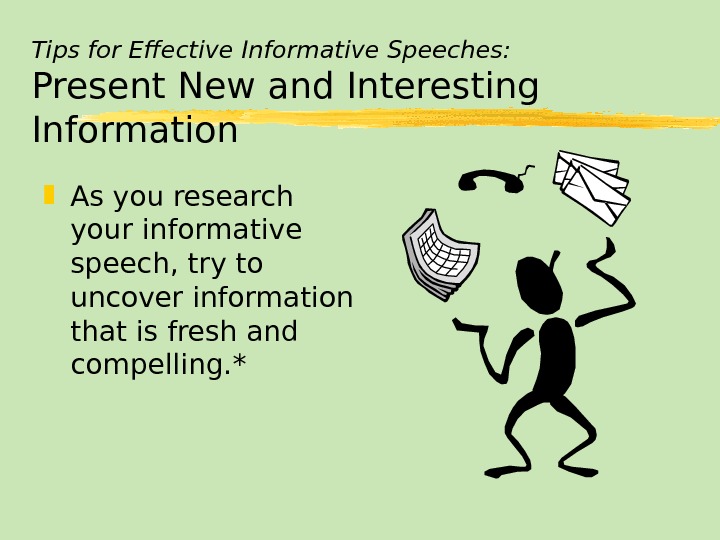
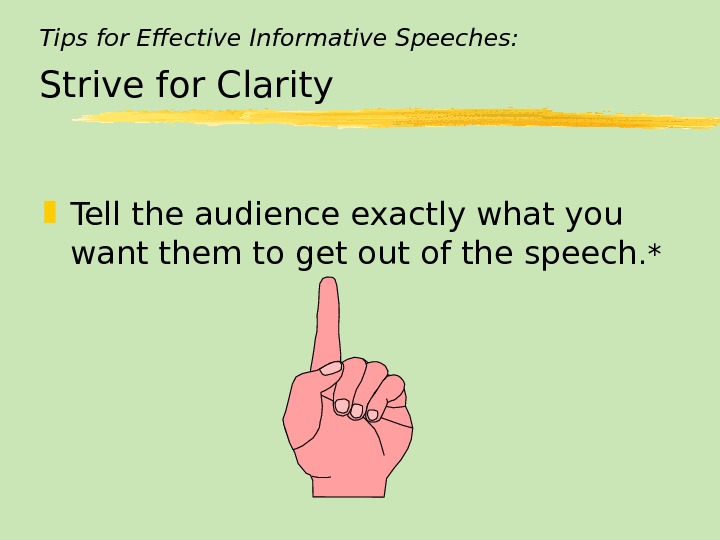
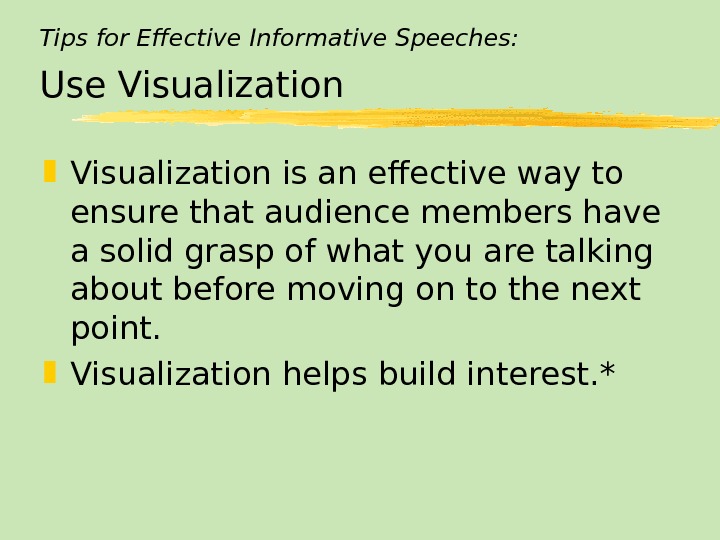
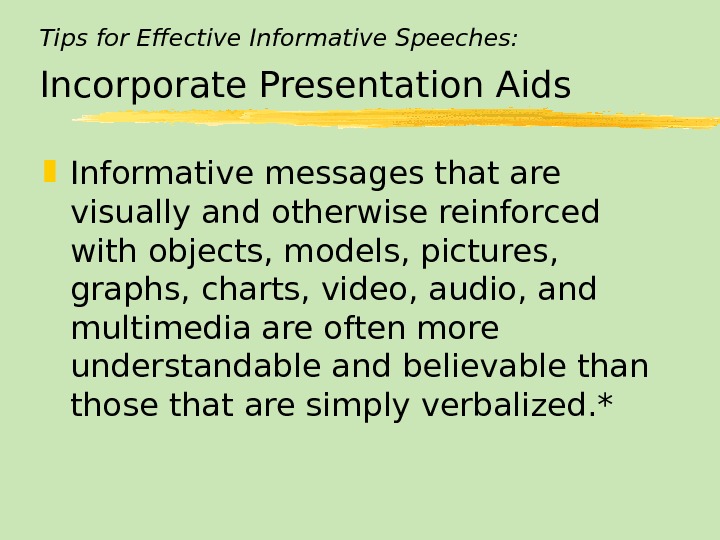
ppt_informative_speech.ppt
- Размер: 345 Кб
- Количество слайдов: 29
Описание презентации Informative Speeches Chapter Thirteen Table of Contents по слайдам
 Informative Speeches
Informative Speeches
 Chapter Thirteen Table of Contents Informative Speaking Goals and Strategies Types of Informative Speeches Organizing the Informative Speech Tips for Effective Informative Speeches*
Chapter Thirteen Table of Contents Informative Speaking Goals and Strategies Types of Informative Speeches Organizing the Informative Speech Tips for Effective Informative Speeches*
 Informative Speaking Goals and Strategies Building Understanding and Awareness Audience Analysis Strategies for Presenting Information*
Informative Speaking Goals and Strategies Building Understanding and Awareness Audience Analysis Strategies for Presenting Information*
 Informative Speaking Goals and Strategies: Building Understanding and Awareness Before we can retain information, we must be able to recognize and understand it.
Informative Speaking Goals and Strategies: Building Understanding and Awareness Before we can retain information, we must be able to recognize and understand it.
 Informative Speaking Goals and Strategies: Audience Analysis As in all types of speeches, an understanding of the audience and the factors affecting it are critical to delivering an effective informative speech. It is crucial that you consider the audience and context when preparing a speech. What do your listeners want to know? What does the context require? *
Informative Speaking Goals and Strategies: Audience Analysis As in all types of speeches, an understanding of the audience and the factors affecting it are critical to delivering an effective informative speech. It is crucial that you consider the audience and context when preparing a speech. What do your listeners want to know? What does the context require? *
 Informative Speaking Goals and Strategies: Audience Analysis Defining Information: operational definition — describes something by explaining what it does. definition by negation — describes something by explaining what it is not. definition by example — provides example of subject. definition by synonym — describes by comparing to another term. definition by etymology — describes by explaining the roots of the term. *
Informative Speaking Goals and Strategies: Audience Analysis Defining Information: operational definition — describes something by explaining what it does. definition by negation — describes something by explaining what it is not. definition by example — provides example of subject. definition by synonym — describes by comparing to another term. definition by etymology — describes by explaining the roots of the term. *
 Informative Speaking Goals and Strategies: Audience Analysis Describing Information: explaining information demonstrating information
Informative Speaking Goals and Strategies: Audience Analysis Describing Information: explaining information demonstrating information
 Types of Informative Speeches about Objects Speeches about People Speeches about Events Speeches about Processes Speeches about Concepts Speeches about Issues*
Types of Informative Speeches about Objects Speeches about People Speeches about Events Speeches about Processes Speeches about Concepts Speeches about Issues*
 Types of Informative Speeches: Speeches about Objects Discussion of anything that is not human, including both animate and inanimate objects. *
Types of Informative Speeches: Speeches about Objects Discussion of anything that is not human, including both animate and inanimate objects. *
 Types of Informative Speeches: Speeches about People Discussion of historically significant individuals and groups, those who have made contributions to society, or those who we find compelling. *
Types of Informative Speeches: Speeches about People Discussion of historically significant individuals and groups, those who have made contributions to society, or those who we find compelling. *
 Types of Informative Speeches: Speeches about Events Discussion of noteworthy occurrences, past and present. *
Types of Informative Speeches: Speeches about Events Discussion of noteworthy occurrences, past and present. *
 Types of Informative Speeches: Speeches about Processes Discussion of a series of steps that lead to a finished product or end result; how something is done, how it is made, or how it works. *
Types of Informative Speeches: Speeches about Processes Discussion of a series of steps that lead to a finished product or end result; how something is done, how it is made, or how it works. *
 Types of Informative Speeches: Speeches about Concepts Discussion of abstract or complex ideas or theories and an attempt to make them concrete and understandable. *
Types of Informative Speeches: Speeches about Concepts Discussion of abstract or complex ideas or theories and an attempt to make them concrete and understandable. *
 Types of Informative Speeches: Speeches about Issues Provide a report or overview of problems or issues in dispute in order to increase understanding and awareness. *
Types of Informative Speeches: Speeches about Issues Provide a report or overview of problems or issues in dispute in order to increase understanding and awareness. *
 Organizing the Informative Speech Chronological and Spatial Patterns Topical Pattern Cause-Effect Pattern Problem-Solution Pattern*
Organizing the Informative Speech Chronological and Spatial Patterns Topical Pattern Cause-Effect Pattern Problem-Solution Pattern*
 Organizing the Informative Speech: Chronological and Spatial Patterns Chronological pattern -arrangement of main points illustrates a sequence of time. Spatial pattern — arrangement of main points illustrates direction relative to one another. *
Organizing the Informative Speech: Chronological and Spatial Patterns Chronological pattern -arrangement of main points illustrates a sequence of time. Spatial pattern — arrangement of main points illustrates direction relative to one another. *
 Organizing the Informative Speech: Topical Pattern The main points of a topic are of relatively equal importance and can be presented in any order relative to the other main points without changing the message. most commonly used of all patterns. *
Organizing the Informative Speech: Topical Pattern The main points of a topic are of relatively equal importance and can be presented in any order relative to the other main points without changing the message. most commonly used of all patterns. *
 Organizing the Informative Speech: Cause-Effect Pattern The main points are arranged to reflect a cause-effect relationship. Generally used with speeches about issues, processes, or events. *
Organizing the Informative Speech: Cause-Effect Pattern The main points are arranged to reflect a cause-effect relationship. Generally used with speeches about issues, processes, or events. *
 Organizing the Informative Speech: Problem-Solution Pattern The main points are arranged to demonstrate the nature and significance of a problem and then to provide justification for a proposed solution to the problem. *
Organizing the Informative Speech: Problem-Solution Pattern The main points are arranged to demonstrate the nature and significance of a problem and then to provide justification for a proposed solution to the problem. *
 Tips for Effective Informative Speeches Strive for Balance Define Your Terms Emphasize the Topic’s Relevance to Your Audience Reinforce Your Message through Repetition Relate Old Ideas to New Ones Present New and Interesting Information Strive for Clarity Use Visualizations Incorporate Presentation Aids*
Tips for Effective Informative Speeches Strive for Balance Define Your Terms Emphasize the Topic’s Relevance to Your Audience Reinforce Your Message through Repetition Relate Old Ideas to New Ones Present New and Interesting Information Strive for Clarity Use Visualizations Incorporate Presentation Aids*
 Tips for Effective Informative Speeches: Strive for Balance When planning a speech, critically evaluate the amount of content you will include with other important speech elements, such as a solid introduction and conclusion and effective transitions. *
Tips for Effective Informative Speeches: Strive for Balance When planning a speech, critically evaluate the amount of content you will include with other important speech elements, such as a solid introduction and conclusion and effective transitions. *
 Tips for Effective Informative Speeches: Define Your Terms If you are at all unsure of whether audience members will know the meaning of a term, define it in the speech. *
Tips for Effective Informative Speeches: Define Your Terms If you are at all unsure of whether audience members will know the meaning of a term, define it in the speech. *
 Tips for Effective Informative Speeches: Emphasize the Topic’s Relevance to Your Audience Demonstrate to your listeners how they can use the information you are giving and how that knowledge will be beneficial to them. *
Tips for Effective Informative Speeches: Emphasize the Topic’s Relevance to Your Audience Demonstrate to your listeners how they can use the information you are giving and how that knowledge will be beneficial to them. *
 Tips for Effective Informative Speeches: Reinforce Your Message through Repetition Repeating key words or phrases at various intervals creates a distinctive rhythm and thereby implants important ideas in listeners’ minds. *
Tips for Effective Informative Speeches: Reinforce Your Message through Repetition Repeating key words or phrases at various intervals creates a distinctive rhythm and thereby implants important ideas in listeners’ minds. *
 Tips for Effective Informative Speeches: Relate Old Ideas to New Ones Draw comparisons to concepts with which audience members are familiar, so they can better understand the information you are giving. *
Tips for Effective Informative Speeches: Relate Old Ideas to New Ones Draw comparisons to concepts with which audience members are familiar, so they can better understand the information you are giving. *
 Tips for Effective Informative Speeches: Present New and Interesting Information As you research your informative speech, try to uncover information that is fresh and compelling. *
Tips for Effective Informative Speeches: Present New and Interesting Information As you research your informative speech, try to uncover information that is fresh and compelling. *
 Tips for Effective Informative Speeches: Strive for Clarity Tell the audience exactly what you want them to get out of the speech. *
Tips for Effective Informative Speeches: Strive for Clarity Tell the audience exactly what you want them to get out of the speech. *
 Tips for Effective Informative Speeches: Use Visualization is an effective way to ensure that audience members have a solid grasp of what you are talking about before moving on to the next point. Visualization helps build interest. *
Tips for Effective Informative Speeches: Use Visualization is an effective way to ensure that audience members have a solid grasp of what you are talking about before moving on to the next point. Visualization helps build interest. *
 Tips for Effective Informative Speeches: Incorporate Presentation Aids Informative messages that are visually and otherwise reinforced with objects, models, pictures, graphs, charts, video, audio, and multimedia are often more understandable and believable than those that are simply verbalized. *
Tips for Effective Informative Speeches: Incorporate Presentation Aids Informative messages that are visually and otherwise reinforced with objects, models, pictures, graphs, charts, video, audio, and multimedia are often more understandable and believable than those that are simply verbalized. *

